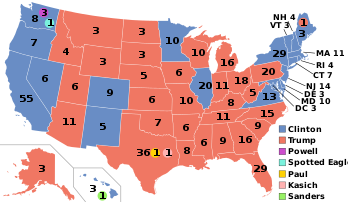2016 U.S. Presidential Election
|
|
|||||||||||||||||||||||||||||
|---|---|---|---|---|---|---|---|---|---|---|---|---|---|---|---|---|---|---|---|---|---|---|---|---|---|---|---|---|---|
|
|||||||||||||||||||||||||||||
|
538 members of the Electoral College 270 electoral votes needed to win |
|||||||||||||||||||||||||||||
| Turnout | 54.7% (estimated) |
||||||||||||||||||||||||||||
|
|||||||||||||||||||||||||||||
|
Presidential election results map. Red denotes states won by Trump/Pence, blue denotes those won by Clinton/Kaine. Numbers indicate electoral votes allotted to the winner of each state. Faithless votes: Colin Powell 3, John Kasich 1, Ron Paul 1, Bernie Sanders 1, Faith Spotted Eagle 1
|
|||||||||||||||||||||||||||||
|
|||||||||||||||||||||||||||||
The United States presidential election of 2016 was the 58th quadrennial American presidential election, held on Tuesday, November 8, 2016. The Republican ticket of businessman Donald Trump and Indiana Governor Mike Pence defeated the Democratic ticket of former Secretary of State Hillary Clinton and U.S. Senator from Virginia Tim Kaine. Trump took office as the 45th President, and Pence as the 48th Vice President, on January 20, 2017. Concurrent with the presidential election, Senate, House, and many gubernatorial and state and local elections were also held on November 8.
Voters selected members of the Electoral College in each state, in most cases by "winner-takes-all" plurality; those state electors in turn voted for a new president and vice president on December 19, 2016. While Clinton received about 2.9 million more votes nationwide, a margin of 2.1%, Trump won 30 states worth a total of 306 electors, or 57% of the 538 available. He won the perennial swing states of Florida, North Carolina, Ohio, and Iowa, as well as Clinton's "blue wall" states of Michigan, Pennsylvania and Wisconsin, which had been Democratic strongholds in presidential elections for decades. Leading up to the election, a Trump victory was considered unlikely by almost all media forecasts.
...
Wikipedia




